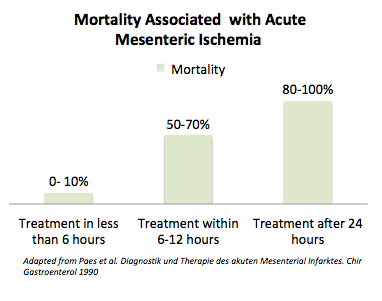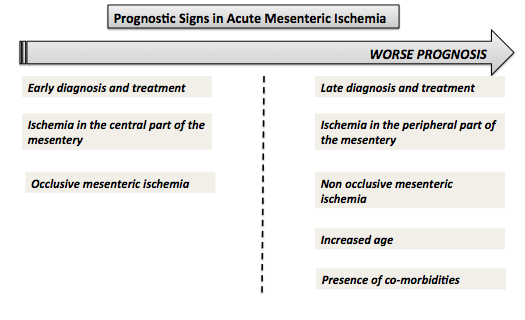Acute mesenteric ischemia natural history, complications and prognosis
Editor-In-Chief: C. Michael Gibson, M.S., M.D. [1]; Associate Editor(s)-in-Chief: Rim Halaby
|
Acute mesenteric ischemia Microchapters |
|
Differentiating Acute mesenteric ischemia from other Diseases |
|---|
|
Diagnosis |
|
Treatment |
|
Case Studies |
|
Acute mesenteric ischemia natural history, complications and prognosis On the Web |
|
American Roentgen Ray Society Images of Acute mesenteric ischemia natural history, complications and prognosis |
|
FDA on Acute mesenteric ischemia natural history, complications and prognosis |
|
CDC on Acute mesenteric ischemia natural history, complications and prognosis |
|
Acute mesenteric ischemia natural history, complications and prognosis in the news |
|
Blogs on Acute mesenteric ischemia natural history, complications and prognosis |
Overview
Acute mesenteric ischemia is an emergency that is associated with high rate of mortality as the treatment id delayed. The early initiation of treatment is associated with low mortality rate ranging from 0 to 10%; whereas delayed treatment beyond 24 hours from the onset of symptoms carries an elevated mortality rate that reaches 80 to 100%[1]. Bad prognostic factors are increased age, presence of comorbidities, non occlusive mesenteric ischemia and a delay initiation in the initiation of treatment.[2]
Natural History, Complications and Prognosis
Mortality
- The mortality associated with acute mesenteric ischemia ranges in general from 50 to 70%, which makes this disease an emergency requiring prompt diagnosis and initiation of treatment.[3]
- Acute mesenteric ischemia is associated with such an elevated mortality rate because of:
- The pathophysiology of the disease itself and effects of hypoxia on the survival of cells of the mesentery
- Delay in diagnosis
- Delay in treatment[4]
- Shown below is a graph depicting the mortality rate in acute mesenteric ischemia depending on the time of initiation of treatment.

Prognosis
The prognostic factors in acute mesenteric ischemia includes the following:
Delay in diagnosis and treatment:
The early initiation of treatment is associated with low mortality rate ranging from 0 to 10%; whereas delayed treatment beyond 24 hours from the onset of symptoms carries an elevated mortality rate that reaches 80 to 100%.[5]
Location of ischemia:
Ischemia in the peripheral portion of the mesentery are associated with worse prognosis compared to ischemia in the central parts of the small intestine due to the presence of collateral vessels.[2]
Underlying cause and pathophysiology:
Non occlusive mesenteric ischemia is associated with worse prognosis compared to occlusive mesenteric ischemia because nonocclusive mesenteric ischemia usually has a non typical presentation causing a delay in diagnosis and treatment.[2]
Mesenteric thrombosis is associated with less mortality compared to superior mesenteric artery ischemia.[6]
Age of the patient:
Elderly patients have higher risk of mortality compared to younger patients.
Comorbidities
- Shown below is an image depicting bad prognostic signs in acute mesenteric ischemia.

References
- ↑ Paes E, Vollmar JF, Hutschenreiter S, Schoenberg MH, Schölzel E: Diagnostik und Therapie des akuten Mesenterialinfarktes. Chir Gastroenterol 1990; 6: 473–80.
- ↑ 2.0 2.1 2.2 Klar E, Rahmanian PB, Bücker A, Hauenstein K, Jauch KW, Luther B: Acute mesenteric ischemia: a vascular emergency. Dtsch Arztebl Int 2012; 109(14): 249–56. DOI: 10.3238/arztebl.2012.0249
- ↑ Acosta S: Epidemiology of mesenteric vascular disease: clinical implications. Semin Vasc Surg 2010; 23: 4–8.
- ↑ Kortmann B, Klar E: Warum wird die mesenteriale Ischämie zu spät erkannt? Zentralbl Chir 2005; 130: 223–6.
- ↑ Paes E, Vollmar JF, Hutschenreiter S, Schoenberg MH, Schölzel E: Diagnostik und Therapie des akuten Mesenterialinfarktes. Chir Gastroenterol 1990; 6: 473–80.
- ↑ Brandt LJ, Boley SJ (2000). "AGA technical review on intestinal ischemia. American Gastrointestinal Association". Gastroenterology. 118 (5): 954–68. PMID 10784596.